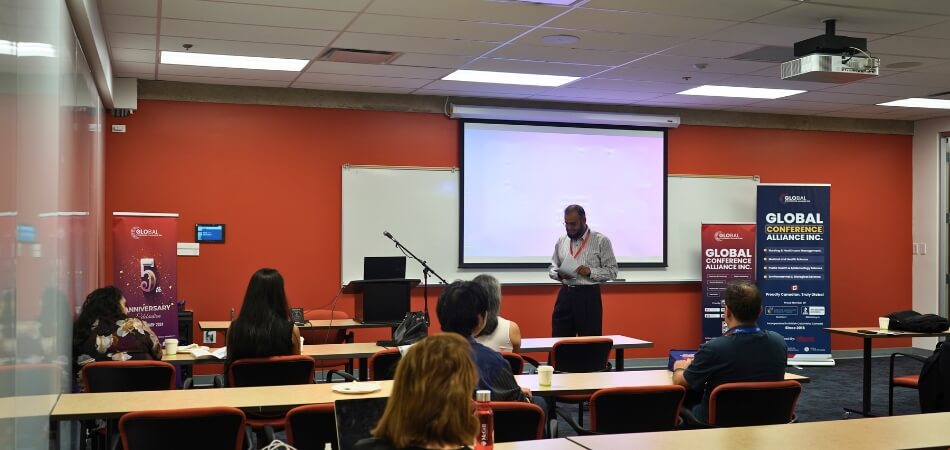Presenting your research at international conferences offers a great opportunity to share your work on a global stage. It enables you to showcase your findings, gain fresh perspectives, and connect with experts from around the world. While it can be challenging, the experience is extremely rewarding. But what are the benefits of presenting research at an international conference?
You gain valuable networking opportunities, receive constructive feedback, and develop your public speaking skills by presenting research at an international conference. It also increases your visibility and recognition in your field, opening doors to potential collaborations.
Staying updated on the latest advancements and experiencing personal growth are additional advantages. All these benefits improve your academic and professional development, establishing you as an expert in your area.
Ready to explore these benefits further? Here’s how you can advance your career by presenting at international conferences.
Key Elements of Research Presentation for a Conference
Delivering a compelling research presentation at a conference requires more than just sharing findings; it demands clarity, engagement, and strategic communication. A well-structured presentation not only highlights your work but also captivates the audience and encourages meaningful discussions. Below, we’ve explored the essential components to ensure your research presentation leaves a lasting impact.
- Introduction: Introduce your research topic, providing context and the significance of your study. It should engage the audience and spark their interest.
- Research Objectives: Clearly state your research goals and the problem you’re addressing. Make sure these objectives guide the rest of your presentation.
- Methodology: Outline the methods used in your research, explaining why they were chosen. Keep this section concise but informative.
- Findings: Present your key findings in a straightforward manner, emphasizing their relevance. Use visuals to support and highlight these results.
- Discussion: Analyze what your findings mean in the broader context of your field. This section connects your results to real-world implications.
- Conclusion: Summarize the main points and highlight the significance of your research. Leave the audience with a clear takeaway.
- Q&A Preparation: Anticipate possible questions and prepare thoughtful responses. This will help you engage with the audience confidently.
Each of these elements contributes to a successful presentation, helping you communicate your research with clarity and authority. By focusing on these components, you can ensure your presentation leaves a lasting impression.
Who Can Present Their Research in International Conferences?
Presenting research at international conferences is a prestigious opportunity for academics, professionals, and students to share their findings with a global audience. With a wide list of upcoming international conferences, there are diverse platforms available for showcasing innovative ideas and experimental studies. We have discussed who can present their research at international conferences below:
Academics and Researchers
University professors, postdoctoral fellows, and PhD students often present their research at international conferences. Their presentations help them share valuable contributions and receive critical feedback. Presenting offers them professional visibility and recognition within their fields. Attending conferences also allows them to stay updated on the latest academic advancements.
Graduate and Undergraduate Students
Graduate students and even some undergraduates with strong research projects can present at conferences. This experience helps them build confidence and establish connections with experts. It also enhances their academic resumes, which is valuable for future careers. Many conferences even have special sessions for student research.
Industry Professionals
Practitioners in various industries who conduct research or develop innovative solutions can present their findings. Doing so showcases their expertise and allows them to influence industry trends. Their presentations often connect academia and real-world applications. Presenting also opens up opportunities for cross-sector collaboration.
Early Career Researchers
Early career researchers are encouraged to present their work to build credibility and gain recognition in their fields. This exposure helps them connect with established professionals and potential collaborators. Presenting early in their careers offers valuable experience for future conferences. It also supports their personal and professional growth.
What Are the Benefits of Presenting Research at an International Conference?
Presenting your research at an international conference can open up a world of possibilities. It’s not just about sharing your findings—it’s about connecting with the global research community and gaining experiences that can shape your career. Let’s explore the major benefits of presenting at these conferences.
Receiving Constructive Feedback
Sharing your research with a diverse audience allows you to receive feedback from multiple perspectives. Experts and peers can provide insights that help refine your work. This feedback helps you identify gaps and improve your research methodology.
Even comments from students can offer valuable ideas you hadn’t considered. Presenting your work publicly also encourages crucial thinking. Receiving diverse feedback strengthens the overall quality of your research.
Skill Development
Conferences offer a platform for developing essential skills, such as public speaking and clear communication. Practicing these skills in a formal setting helps you become more confident in your abilities. Answering questions and handling critiques sharpens your critical thinking.
Improving these soft skills is beneficial not only in academia, but also in various professional settings. As you gain experience, these presentations become easier. Both research and career pursuits can benefit from learning these skills.
Visibility and Recognition
Presenting research at an international conference enhances visibility and recognition among global peers, creating valuable networking opportunities. It showcases expertise, opening doors to collaborations and career advancements.
The importance of international conferences lies in their ability to provide a platform for sharing innovative ideas, gaining constructive feedback, and staying updated with advancements in the field. Such exposure boosts credibility and ensures the research reaches a wider, more influential audience.
Collaboration Prospects
Conferences provide a unique environment for meeting potential collaborators. Face-to-face interactions often lead to joint research projects, co-authored papers, or grant opportunities. Collaboration accelerates the development and publication of innovative ideas.
Collaboration also expands your research network and introduces you to new methodologies. These partnerships can bring fresh perspectives that enrich your work. Conferences offer the perfect space to facilitate these relationships.
Networking Opportunities
Conferences bring together professionals from various fields, creating opportunities to build lasting connections. These interactions can lead to future collaborations, mentorships, and even career opportunities. Establishing a network in your industry or academic field is vital for long-term growth.
Engaging with experts, peers, and industry leaders improves your visibility. Networking at conferences often results in collaborations that wouldn’t happen otherwise. This gives your work greater impact and broadens your professional horizon.
Staying Updated
Attending conferences helps you stay informed about the latest trends, technologies, and methodologies in your field. This exposure can inspire new ideas and directions for your own research. Keeping up with advancements is essential for maintaining relevance in your work.
Presenting also allows you to see how your research fits into the broader landscape. Staying informed helps you adapt and evolve. Understanding these trends is critical for researchers who want to remain at the forefront of their discipline.
Personal Growth
Presenting research internationally boosts your confidence and helps develop a sense of achievement. It challenges you to communicate complex ideas to diverse audiences. This experience enhances both your academic and personal growth.
Stepping outside your comfort zone strengthens your resilience. It helps develop a global perspective on your research and its impact. The personal growth you gain from these experiences is invaluable.
How to Present Your Research at an International Conference?
Presenting your research at an international conference can feel daunting, but with proper preparation, it can be a highly rewarding experience. Following a clear process helps ensure your presentation is organized and impactful. Here’s a step-by-step guide to help you navigate the journey from preparation to delivery.
Step 1: Choose the Right Conference
Identify international conferences aligned with your research topic. Look for reputable events with relevant themes, a target audience, and strong networking opportunities. Check submission deadlines, presentation formats, and acceptance rates.
Research keynote speakers and past editions for credibility. Align the conference with your career goals to maximize the impact of presenting your research on a global stage.
Step 2: Submit Your Abstract
Prepare a concise and compelling abstract that clearly summarizes your research. Focus on highlighting your main findings and their significance. Follow the conference’s format and submission guidelines closely to avoid disqualification. A well-written abstract increases your chances of being accepted to present.
Step 3: Prepare Your Presentation
Design your slides to visually support your key points without overwhelming the audience. Practice delivering your presentation aloud, refining your speaking pace and tone. Ensure that your content is concise, engaging, and easy to follow for an international audience. Rehearsing multiple times builds your confidence and improves your delivery.
Step 4: Engage with the Audience
Engaging with the audience is crucial when presenting research at an international conference. Highlight your key findings clearly and use visuals effectively. Encourage questions to encourage interaction and exchange ideas. Sharing insights with a diverse audience showcases the reasons to attend global conferences, such as networking, gaining fresh perspectives, and expanding professional opportunities, making your presentation impactful and memorable.
Step 5: Practice Handling Q&A
Anticipate the types of questions you might receive based on your research topic. Prepare clear and concise responses to these potential questions ahead of time. Stay calm if you receive challenging or unexpected questions, and focus on clarifying your points. Handling Q&A effectively can leave a lasting positive impression.
Tips to Help You Present Strong Research at an International Conference
Presenting at an international conference can be both exciting and nerve-wracking. A strong presentation requires preparation, focus, and confidence. To help make your presentation a success, here are some tips to guide you.
- Know Your Audience: Personalize your presentation to match the knowledge level and interests of your audience. This ensures they stay engaged and connected.
- Practice, Practice, Practice: Rehearse your presentation multiple times to become familiar with the content. This will help you deliver your message confidently and smoothly.
- Use Clear and Concise Slides: Create slides that highlight key points without overwhelming your audience. Use visuals to reinforce your message and maintain focus.
- Stay on Time: Respect the conference schedule by keeping your presentation within the allotted time. This shows professionalism and consideration for others.
- Engage with the Audience: Make eye contact and speak clearly to maintain your audience’s attention. Encourage participation by asking questions or sparking discussion.
- Anticipate Questions: Prepare for potential questions by reviewing your material from different angles. Thoughtful responses enhance your credibility and expertise.
- Stay Calm and Confident: If something goes wrong, stay composed and adapt quickly. Confidence in your delivery will help you regain control of the situation.
FAQs About the Benefits of Presenting Research at International Conference
Presenting research at an international conference offers numerous opportunities that go beyond sharing your work. Whether you’re a student or a professional, participating in these events can advance your career. Here are some frequently asked questions to help you understand the key benefits.
How Can Presenting at a Conference Impact My Career?
Presenting at conferences boosts your visibility and establishes you as an expert in your field. It opens doors to future opportunities, including job offers, speaking engagements, and collaborations. This exposure can significantly accelerate career advancement and professional growth.
Can Presenting Help Me Gain Confidence in Public Speaking?
Presenting research at conferences helps you develop public speaking skills through real-world practice. Engaging with an audience and handling questions builds confidence. These experiences are valuable not only in academia but also in broader professional settings.
Does Presenting at a Conference Help in Expanding My Research Horizons?
Attending and presenting at international conferences exposes you to new ideas, methodologies, and trends. This knowledge can inspire fresh perspectives and directions for your research. It encourages you to think beyond your current focus and explore new possibilities.
How Can Conference Presentations Contribute to My Academic Reputation?
Presenting research helps establish your academic reputation by showcasing your contributions to the global research community. Recognition from peers and experts can lead to invitations for joint research, collaborations, or future speaking engagements, further enhancing your academic standing.
Are There Any Long-Term Networking Benefits from Presenting at Conferences?
Building connections at conferences can have long-term benefits. The relationships you form can lead to future collaborations, partnerships, or mentorship opportunities. These networks can play a crucial role in supporting your professional growth and long-term success.
Can Presenting at a Conference Help Me Stay Updated in My Field?
Presenting your research at a conference allows you to stay informed about the latest advancements in your field. It offers a chance to engage with cutting-edge research and discover emerging trends that could lead to the advancement of your work.
How Does Presenting My Work Support Personal Growth?
Presenting at international conferences helps you step out of your comfort zone, which encourages personal development. It builds resilience, improves your ability to adapt, and gives you a global perspective on your work, contributing to both personal and professional growth.
Bottom Line
Participating in international conferences is a valuable experience that can greatly improve your research and career. It offers a platform to showcase your work, gain new insights, and connect with professionals worldwide.
Among these opportunities, what are the benefits of presenting research at an international conference? Presenting allows you to receive constructive feedback, expand your network, and increase your visibility in the field. It also helps you develop essential skills like public speaking and critical thinking.
Realizing these benefits can lead to personal growth and open doors to future collaborations. So, presenting at international conferences can significantly upgrade your professional journey.








